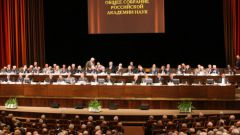Instruction
1
So, in contrast to the system of the Russian language, where the action takes place during the time interval (past, present and future) in English the verb refers not only to when the action occurs, but how. Therefore, the basis is divided into four temporal groups: simple, long, complete (or perfect) and long-completed. Their names speak for themselves.
2
Simpler times (Simple Tenses) indicate that the effect of the ordinary occurring with some regularity (always, often, seldom, usually, twice a week, and so on). Also it is used for a statement of fact (I live in Moscow.).
3
For a long period of time (Progressive/Continuous Tenses) indicate that the effect lasts, lasted, or will last a certain time (now or in the moment), a certain period of time (until some time), and during another action in the past or future.
4
Compare the two sentences. "I usually eat for Breakfast a cheese sandwich" and "We eat great pizza now." In the first case the action takes place on a regular basis (this is indicated by the adverb "normally") thus in the English sentence you need to use the present simple (I usually eat a cheese sandwich for breakfast), while in the second sentence the action is happening at the moment, so you need to use a real long time (Present Progressive/Continuous) (We are eating a wonderful pizza now.)
5
Times perfect (the Perfect Tenses) indicate that the action has ended or will end, and the result of this action is obvious. On Russian language the verb is completed in the present time translated by a verb in the past tense. For example, compare the two sentences. "I was always on time" and "I just came". In the first sentence, the usual action in the past. Therefore, the translation need to use the past simple (I always came in time). In the second sentence, the action ended, is the result (I'm here), so use present perfect (Present Perfect). In English this sentence would be: I have just come.
6
And finally, the last group times – long-committed (Perfect Progressive/ Continuous Tenses) indicate that the action lasted for a certain time in the past or will last in the future, but it is ended or completed and the result will be evident. That is, the use of this time involves a fairly close causal connection between the action and its effect.
7
Learn how to use each of these times is possible only in practice. Do as many exercises, do tests, bring a skill to automaticity, and then you will be able without difficulty to distinguish the days of the British.


